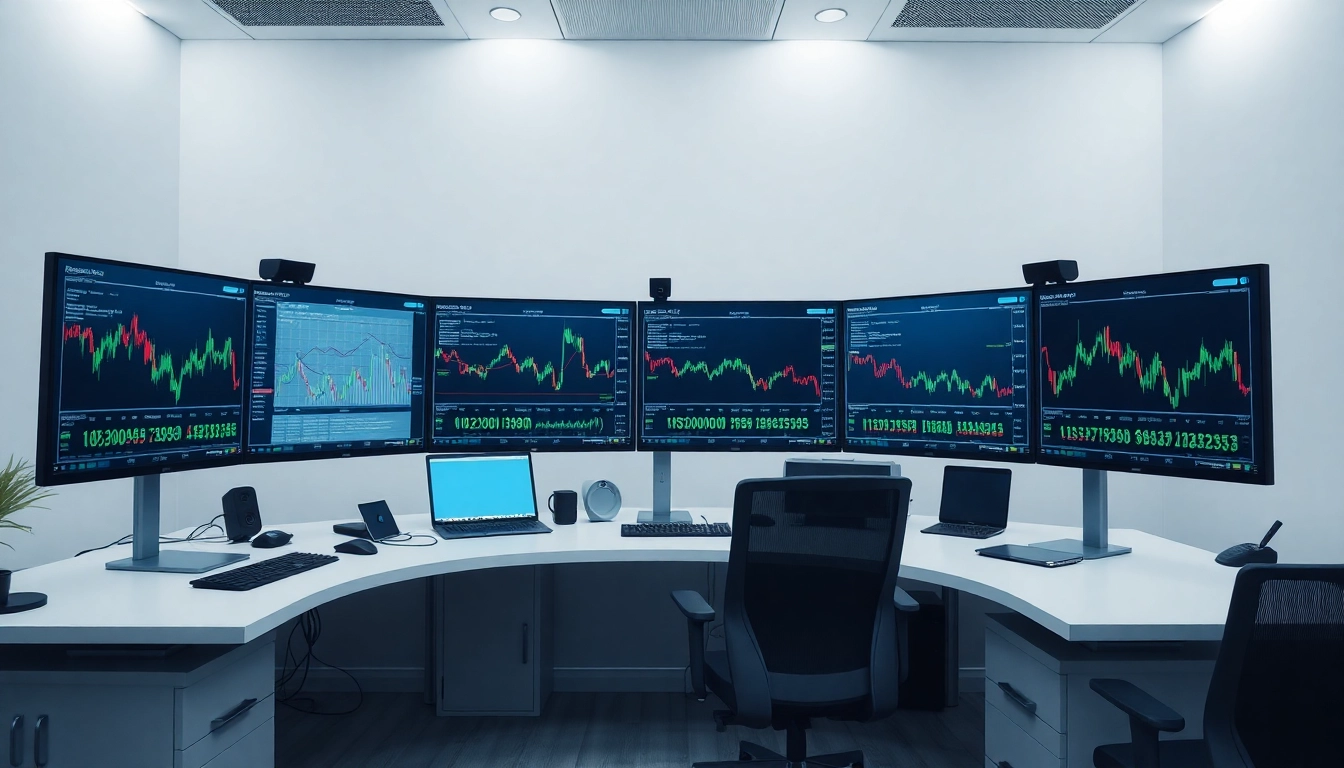Introduction to Online Trading UK: Opportunities and Risks
In recent years, the landscape of investment has undergone a dramatic transformation, with online trading becoming increasingly accessible and popular across the United Kingdom. Whether you’re a novice aiming to grow your savings or an experienced investor seeking diverse assets, understanding the nuances of Online Trading UK is essential for making informed decisions and maximizing your potential returns. This comprehensive guide delves into the fundamentals of UK online trading, exploring the top platforms, regulatory environment, strategic approaches, and risk management techniques to help you navigate this dynamic market confidently.
What is Online Trading in the UK?
Online trading in the UK refers to the process of buying and selling financial securities—such as stocks, ETFs, forex, commodities, and derivatives—via digital platforms provided by brokerage firms. This mode of trading allows individual investors to access global markets from the comfort of their homes, using internet-enabled devices. The core advantage lies in the democratization of investing, removing barriers historically associated with traditional stockbroking services.
Key features of online trading include real-time account access, instant order execution, and sophisticated analytical tools. UK traders can engage in various instruments, including shares listed on the London Stock Exchange or international exchanges, options, futures, cryptocurrencies, and more. With rapid technological advancements, platforms now offer features like automated trading, social trading, and integrated news feeds, further enhancing the trading experience.
Legal and Regulatory Framework for UK Traders
The UK’s online trading environment is governed by a robust regulatory framework designed to protect investors and ensure fair market practices. The Financial Conduct Authority (FCA) is the primary regulatory body overseeing brokerage firms and trading platforms operating within the country. FCA regulation mandates strict standards related to transparency, capital adequacy, client funds segregation, and complaint resolution.
Traders should prioritize platforms that are FCA-licensed, as this accreditation ensures adherence to UK laws and access to investor compensation schemes—such as the Financial Services Compensation Scheme (FSCS)—that safeguard client deposits up to £85,000. Additionally, EU regulations like MiFID II influence operational transparency and trading costs, even post-Brexit, maintaining high standards for traders.
Common Risks and How to Mitigate Them
While online trading offers lucrative opportunities, it also entails significant risks. Market volatility can lead to substantial financial losses, especially for unprepared traders. Other risks include leverage-induced losses, cybersecurity threats, misinformation, and emotional decision-making.
Market Volatility
Markets can shift rapidly due to economic data releases, geopolitical events, or central bank policies. To mitigate this, traders should employ risk management tools like stop-loss and take-profit orders and stay updated with economic calendars and news feeds.
Leverage Risks
Using leverage amplifies both gains and losses. Novice traders should practice cautious leverage levels and fully understand margin requirements, preferably starting with demo accounts.
Cybersecurity Threats
Secure your trading accounts with strong, unique passwords, enable two-factor authentication, and use reputable, encrypted platforms. Regularly update security software and monitor account activity for unauthorized access.
Emotional and Psychological Risks
Impulsive decisions driven by fear or greed can impair judgment. Maintain discipline by adhering to a well-developed trading plan, journaling trades, and setting realistic goals.
Top Platforms for Online Trading in the UK
Choosing the right platform is pivotal to your trading success. Leading UK-based brokers offer diverse features tailored to different levels of experience. Here’s an overview of some top contenders based on features, fees, and user experience:
Saxo Bank
Saxo Bank is renowned for its comprehensive research tools, advanced trading platforms, and extensive asset classes. Suitable for active traders and professionals, it offers competitive spreads and a range of account types.
IG Group
IG is a market leader with a strong UK presence, offering a user-friendly interface and rich educational resources. It provides derivatives trading, shares dealing, and insurance-based products, with notable features for day traders.
Trading 212
Ideal for beginners, Trading 212 provides commission-free trading on stocks and ETFs, fractional shares, and a demo account to practice strategies without risk. Its intuitive app makes entry into online trading straightforward.
Interactive Brokers
Known for its low commissions and global access, Interactive Brokers caters to experienced traders who require advanced tools, extensive asset coverage, and flexible order types.
Freetrade
Freetrade emphasizes zero commission investing, focusing on UK, US, and European stocks. Its simple interface suits new investors looking to build diversified portfolios with minimal fees.
Features of Leading UK Trading Platforms
When evaluating trading platforms, consider the following essential features:
- User Interface & Usability: Intuitive navigation suitable for both beginners and experts.
- Asset Coverage: Availability of stocks, forex, commodities, and derivatives.
- Order Execution Speed & Reliability: Fast and dependable trades are crucial during volatile markets.
- Research & Analytical Tools: Access to charts, indicators, news feeds, and market insights.
- Fees & Commissions: Transparent cost structures with competitive spreads and commissions.
- Educational Resources: Tutorials, webinars, and demo accounts to foster learning.
- Customer Support & Security: Responsive service and rigorous security protocols.
For instance, platforms like IG and Saxo Bank excel in research tools, while Trading 212 prioritizes ease of use and zero commissions. Match platform features with your trading objectives to optimize your experience.
How to Choose the Right Platform for Your Goals
Assessing your trading goals is essential before selecting a platform. Here are steps to guide your decision-making:
- Define Your Trading Style: Are you a day trader, swing trader, or long-term investor?
- Identify Asset Preferences: Do you mainly trade stocks, forex, or cryptocurrencies?
- Evaluate Budget & Costs: How much are you willing to spend on commissions and fees?
- Check Regulatory Compliance: Ensure the platform is FCA-licensed for peace of mind.
- Test User Interface & Features: Use demo accounts to test usability and tools.
By aligning your trading objectives with platform offerings, you can establish a solid foundation for consistent and profitable trading. Remember that the best platform is one that adapts to your evolving needs and supports your learning curve.
Getting Started with Online Trading UK
Setting Up Your Trading Account
The initial step involves selecting a reputable broker, completing their registration process, and verifying your identity as required by UK regulations. Prepare documents such as proof of address and ID. Once approved, fund your account via bank transfer, debit/credit card, or digital wallets, considering any minimum deposit requirements.
Basic Trading Strategies for Beginners
Starting with simple strategies is advisable. Examples include:
- Buy and Hold: Purchasing quality stocks for long-term growth.
- Swing Trading: Exploiting short-term price swings based on technical analysis.
- Dollar-Cost Averaging: Investing fixed amounts periodically to mitigate market timing risks.
Always test strategies in a demo environment before risking real capital.
Educational Resources and Trading Courses
A wide array of educational tools are available, from online courses at institutions like the London Academy of Trading to webinars hosted by brokers. Building your knowledge base on market fundamentals, technical analysis, and risk management is crucial for sustained success.
Advanced Trading Techniques and Market Analysis
Technical and Fundamental Analysis
Technical analysis involves studying price charts, patterns, and indicators to forecast future movements. Fundamental analysis, on the other hand, evaluates economic indicators, company earnings, and macroeconomic factors. Combining these approaches offers a holistic view of the market.
Using Trading Indicators and Automated Tools
Popular indicators include Moving Averages, RSI, MACD, and Bollinger Bands. Automated tools like Expert Advisors or trading bots can execute predefined strategies based on criteria, minimizing emotional bias and enhancing efficiency.
Managing Risks and Emotional Trading
Implement risk controls such as setting stop-loss orders, limiting position sizes, and diversifying portfolios. Additionally, maintaining discipline, avoiding overtrading, and practicing mindfulness foster sound decision-making, particularly during turbulent market conditions.
Performance Metrics and Success Tips for UK Traders
Tracking Your Progress and Performance
Use trading journals and analytics tools to record trades, analyze win/loss ratios, and assess risk-reward profiles. Regular review helps identify strengths, weaknesses, and areas for improvement.
Optimizing Your Trading Plan Over Time
Adopt a growth mindset by adjusting strategies based on performance data and market changes. Continual learning, such as attending webinars or reading market reports, keeps you ahead in the ever-evolving trading landscape.
Staying Updated with Market News and Trends
Leverage real-time news feeds, economic calendars, and expert analyses to inform trading decisions. Staying attuned to political developments, central bank policies, and geopolitical events enhances situational awareness and strategic agility.



